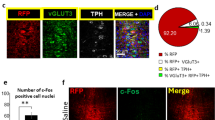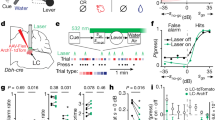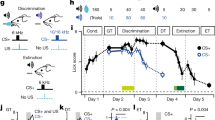Abstract
CONSIDERABLE attention has been given to suggestions that forebrain noradrenaline (NA) plays a central role in the associative learning process1,2. For example, Kety2 has proposed a general noradrenergic theory of learning in which he hypothesises that NA release associated with reinforcement facilitates the formation of learned associations. Crow3 subsequently suggested that the dorsal NA bundle which extensively innervates the cortex could be the crucial pathway involved. In support of this hypothesis are findings that learning on shock avoidance4 and appetitive5–7 tasks is impaired after widespread loss of forebrain NA and dopamine. More specifically, Anlezark et al.8 found that bilateral electrolytic lesions to the origins of the dorsal NA bundle in the locus coeruleus impaired the acquisition of runway behaviour. Cortical forebrain NA loss was reduced to 69% of control levels in their study. We have used 6-hydroxydopamine (6-OHDA) treatments to achieve virtually total forebrain NA loss and have found no impairment on the acquisition of runway behaviour. The NA-depleted animals, were however, slow to inhibit running during extinction, suggesting that although the dorsal NA system is not involved in the acquisition of reinforced responses, it is important for the response to non-reward.
This is a preview of subscription content, access via your institution
Access options
Subscribe to this journal
Receive 51 print issues and online access
$199.00 per year
only $3.90 per issue
Buy this article
- Purchase on Springer Link
- Instant access to full article PDF
Prices may be subject to local taxes which are calculated during checkout
Similar content being viewed by others
References
Stein, L., in Animal Behaviour and Drug Action, Ciba Symp., 91–113 (Churchill, London, 1964).
Kety, S. S., Res. Publ. Ass. Res. nerv. ment. Dis., 50, 376–389 (1970); also in The Neurosciences: Second Study Program (edit. by Schmitt, F. O.), 324–336 (Rockefeller University Press, New York, 1970).
Crow, T. J., Psychol. Med., 2, 414–417 (1972); 3, 1–5 (1973).
Cooper, B. R., Breese, G. R., Grant, L. D., and Howard, J. L., J. Pharmac. exp. Ther., 185, 358–370 (1973).
Mason, S. T., and Iversen, S. D., Narure, 248, 297–298 (1974).
Ungerstedt, U., and Lundberg, L., in Frontiers in Catecholamine Research, (edit. by Usdin, E., and Snyder, S. H.), 689–693 (Pergamon, Oxford, 1974).
Fibiger, H. C., Phillips, A. G., and Zis, A. P., Pharmac. Biochem. Behav., 2, 87–91 (1974).
Anlezark, G. M., Crow, T. J., and Greenway, A. P., Science, 181, 682–684 (1973).
König, J. F., and Klippel, R. A., The Rat Brain, A stereotaxic Atlas (Williams and Wilkins, Baltimore, 1963).
Cuello, A., Hiley, R., and Iversen, L. L., J. Neurochem., 21, 1337–1340 (1973).
Gray, J. A., in Handbook of Psychopharmacology (edit. by Iversen, L.L., Iversen, S. D., and Snyder, S. H.) (Plenum, New York, in the press).
Gray, J. A., McNaughton, N., James, D. T. D., and Kelly, P. H., Nature, 258, 424–425 (1975).
Author information
Authors and Affiliations
Rights and permissions
About this article
Cite this article
MASON, S., IVERSEN, S. Learning in the absence of forebrain noradrenaline. Nature 258, 422–424 (1975). https://doi.org/10.1038/258422a0
Received:
Accepted:
Issue Date:
DOI: https://doi.org/10.1038/258422a0
This article is cited by
-
The effects of suppressing the biological stress systems on social threat-assessment following acute stress
Psychopharmacology (2020)
-
Monoamine oxidase activity and serotonin metabolism in the rat brain during latent inhibition
Bulletin of Experimental Biology and Medicine (1992)
-
Central noradrenaline depletion antagonizes aspects ofd-amphetamine-induced hyperactivity in the rat
Psychopharmacology (1986)
-
CNS-related (side-)effects of ?-Blockers with special reference to mechanisms of action
European Journal of Clinical Pharmacology (1985)
-
The organization and regulation of sleep
Experientia (1984)
Comments
By submitting a comment you agree to abide by our Terms and Community Guidelines. If you find something abusive or that does not comply with our terms or guidelines please flag it as inappropriate.



